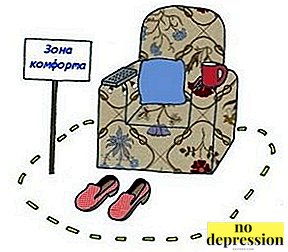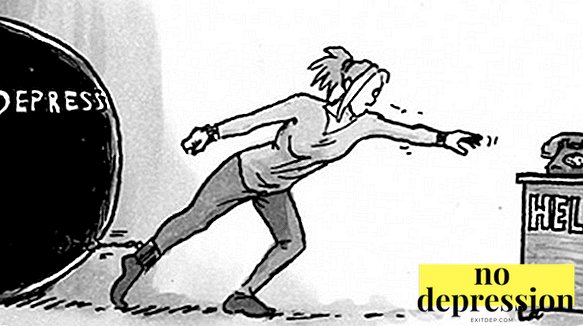Many are now talking about the comfort zone and leaving it.
This concept can also be found in the writings of popular theorists of psychology, such as Brian Tracy, Meg Jay, and in social networking communities dedicated to personal growth, or positioning themselves so, and in casual dialogues with people who are sometimes more than far from psychology.
And many people who have come into contact with this concept are eager to find out how to get out of the comfort zone, whether it is worth going out at all - suddenly there are evil wolves or something worse - and how this can help them.
What it is?

Comfort zone - this is a conditional zone of a person’s living space, in which he feels habitually, where he knows everything and feels this or that degree of confidence.
In most cases, the term “comfort zone” means exactly the comfort zone: a person has reached a certain stability in lifehe has a salary that suits him, his life flows measuredly and predictably, and there is no particular need to change something in it.
Therefore, his personal development stops, it even degrades in part. A feeling of comfort and calm acts on his personality negatively, and in order to change something, it is necessary to make an effort and go beyond the standard course of life.
But, contrary to many statements, the comfort zone is not always associated with something purely positive, comfortable, and for this reason causing difficulties in the development process of every single person.
For example, a woman who is dissatisfied with the relationship with her husband and is engaged in a monotonous, already bored activity can understand that something needs to be changed. At the same time she has lack the courage to start these changes.
Her usual area of life is a comfort zone (although it’s really difficult to call her comfortable), and in order to change something, she needs to leave this area: discuss the situation with her husband, change jobs or introduce some visible diversity into it, and acquire new skills.

Some people who do not have a relationship with psychology and psychiatry, but are eager to make their opinion important to others, can learn a few terms from popular articles, including the definition of “comfort zone”, and use them without fully understanding the essence of many things.
For example, there are situations when people learn that their friends or acquaintances have depression or some other mental illness.
And they decide that their valuable opinion is very important for a persontherefore they say to him: “You need to leave the comfort zone - and everything will be very good, this depression will pass, you just need to get a new job and start learning Japanese.”
And for a man, even to fill the bed - feat. And he needs a psychotherapist and antidepressants, not popular books about how to achieve the unattainable.
The comfort zone arises at the moment when a person becomes accustomed to what surrounds him, gets used to a certain daily routine, certain interests and activities.
The longer he is in this familiar area, the harder it is for him to change something in his life structure.
Personal space in communication

There is also a comfort zone in communication.
It is also called personal space.
For each person, this comfort zone is different when communicating, but in general it means the area that is located within 20-40 centimeters from the body and face of a person.
People who are involved in areas related to close social interaction, requiring entry into the personal space (for example, nurses, nurses, caregivers), it is important to be able to find common ground with a personso that he feels comfortable even when his comfort zone is invaded.
Types of personal space:
- intimate zone (40 centimeters and less). This area is close friends, parents, partner. If a stranger invades this zone, the person may feel perceptible discomfort;
- personal zone (from 40-50 centimeters to one and a half meters). This area is intended for buddies, acquaintances, colleagues;
- social zone (from 1.5 meters to 3.5). Area for strangers. If a stranger comes too close, it will also cause anxiety and irritation;
- public area (more than 7 meters). In this space, a public person is comfortable talking to a group of people.

If a person feels affection for another person and understands that he is ready to communicate with him even closely, this means that he feels strong sympathy for himand communication can easily grow into something more.
Danger of being in it
The main dangers of staying in the comfort zone:
- Slowdown or complete cessation of development. A person who is accustomed to certain life circumstances finds it difficult to change anything, he feels insecure when he thinks about changes. He is gradually becoming more and more difficult to force himself to be interested in something new, and at some point he may clearly realize that he does not seem to need it.
This conclusion is often reached by middle-aged people who are satisfied with everything in life. In part, this rejection of development is also associated with age-related changes.
- The need to endure the inconvenience that is part of the comfort zone. These inconveniences can be both insignificant and very serious.
 For example, toxic relationships with friends, parents, or a partner, the need to endure violence, bullying, low wages, and hard work associated with an abundance of stress can be part of a comfort zone.
For example, toxic relationships with friends, parents, or a partner, the need to endure violence, bullying, low wages, and hard work associated with an abundance of stress can be part of a comfort zone.Breaking a vicious circle is very difficult, and often a person even in circumstances far from comfort begins to calm himself, think up reasons to do nothing for fear that everything will be even worse: you will not be able to find a new job, your husband will find and beat even stronger court proceedings will lead nowhere, and in general “beating means loving”.
- Reduced stress resistance. If a person is in his comfortable - or not - comfortable zone for a long time, it becomes more and more difficult for him to adapt to changes.
Any unexpected troubles or new conditions that should be taken into account can knock him out of a rut.
- Inflexibility in views. There is a phenomenon that can be called an information comfort zone. Each person has a certain frame of reference, and some of them may change over time under the influence of various circumstances and new information. Changes in attitudes, if they are appropriate and reflect the real essence of things, are important and help to develop.
 But the person in the comfort zone is locked in his usual areas of knowledge and belief, beyond which he does not go. Partly because of the fear of being frustrated, feeling insufficiently competent, partly because of the belief that the current belief systems are entirely correct.
But the person in the comfort zone is locked in his usual areas of knowledge and belief, beyond which he does not go. Partly because of the fear of being frustrated, feeling insufficiently competent, partly because of the belief that the current belief systems are entirely correct.
Why do I need to go out of the box?
The main reasons for leaving the comfort zone are:
- Productivity will increase. The desire to work will increase, the motivation will increase, and the effect of novelty will help to maintain it for quite a long time.
Also, a person in a familiar environment is inclined to demand less from himself, if there is an opportunity for this, and there is no desire to learn new things.
Fear of leaving the comfort zone makes a person pretend that he is actively engaged in something, but in fact the only purpose of this imitation of turbulent activity is the desire to avoid new activity.
- There will be more ideas and plans. A person living a habitual, monotonous life, deteriorates his ability to invent creative ideas, because there are few impressions in his life, few new experiences, so there’s simply no place to eat for mind and creativity.
 If something new appears in life, it will encourage a person and his mind, make the brain think of new, unusual patterns, which will lead to the emergence of many beautiful ideas. The emergence of new ideas, in turn, will spur motivation and force to look differently at the established views.
If something new appears in life, it will encourage a person and his mind, make the brain think of new, unusual patterns, which will lead to the emergence of many beautiful ideas. The emergence of new ideas, in turn, will spur motivation and force to look differently at the established views. - It will be much easier to adapt to change. Those situations that were previously unsettling will suddenly seem insignificant to a person who has brought newness to his usual course of life and has solved complex problems that he has encountered on his way. The brain will begin to think more actively, it will be easier for him to find solutions for what seemed very difficult earlier, and new skills and knowledge will help to move forward faster.
- It will be easier to leave the comfort zone and increase its size in the future. With each experience of expanding life's boundaries, it will be easier and simpler, and the level of anxiety and stress will decrease significantly.
Exiting the comfort zone or expanding its boundaries is the only path that leads to development.
The usual situation inhibits a person’s desire to develop, impairs his abilities and, as a result, leads to degradation.
How to get out of it?

To get out of the comfort zone, you must first make yourself do it, and it is not so easy for a person who has lived in a familiar, though not always pleasant, rhythm of life for a long time.
Tips for those who are trying to get themselves out of the comfort zone or have already begun to gradually change:
- Realize the need for change. Set a clear thought in front of you: my life needs to be changed, because there are reasons for that. Try to hold back thoughts related to the fact that nothing will come of it and that the current situation is quite a nothing. Write a list of what I would like to change, analyze the situation and come up with rough plans.
- Remember that getting out of your comfort zone is not always a violent leap. All people have different life circumstances and different states of mental and physical health. In addition, the idea that it is necessary to do something very complicated can quickly and quickly make you get scared by the very thought of it and retreat.
So remember: even tiny steps to change are important, because they lead to development in any case.
Make step-by-step plans, break tasks into pieces, try to rest.
- Praise yourself more often. People often do not dare to praise themselves and admit to themselves that they are great. After all, if you think about it, you could do more, come up with something more interesting, go faster. And in general, that Vasya, perhaps, deserves much more to be praised. But in fact, every step towards positive change is worth praise, because it brings you closer to your goal.
Exercises to help get out of your comfort zone.:
- Make changes in the details. Make adjustments to the mode of the day, go to work in a new way, buy pleasant things for the house, which will make you feel a little bit of novelty.
- Start a New acquaintances. If the circle of acquaintances has not been replenished with someone new and interesting for a long time, it is time to fix it. Each person is a storehouse of knowledge, skills, certain views on life, which he can share.
- Start learning what has long seemed interesting and useful. Try to find new hobbies or learn new skills. If you feel the need to learn gradually, allow yourself this, but try to study regularly.
- Get out of the information comfort zone. Read articles on a topic that you practically do not know, watch a film in an unusual genre, try to study more deeply the topic with which you have the most radical prejudices.
- Wear unusual clothes. This will bring newness into reality and make you feel different.
- Arrange a spontaneous trip. This will help change the situation, get new impressions, make you invigorate and require the brain to make important decisions quickly.

Also determine for yourself a certain number of goals that are extremely important to you and gradually walk towards them. Planning activities can help with this.
Many people, not without reason, believe that the desire for stability and tranquility is good goal. But it is important to understand that stability is not always a blessing and it is necessary to make efforts for development as often as possible.
How to get out of the comfort zone? Opinion psychologist:

 For example, toxic relationships with friends, parents, or a partner, the need to endure violence, bullying, low wages, and hard work associated with an abundance of stress can be part of a comfort zone.
For example, toxic relationships with friends, parents, or a partner, the need to endure violence, bullying, low wages, and hard work associated with an abundance of stress can be part of a comfort zone. But the person in the comfort zone is locked in his usual areas of knowledge and belief, beyond which he does not go. Partly because of the fear of being frustrated, feeling insufficiently competent, partly because of the belief that the current belief systems are entirely correct.
But the person in the comfort zone is locked in his usual areas of knowledge and belief, beyond which he does not go. Partly because of the fear of being frustrated, feeling insufficiently competent, partly because of the belief that the current belief systems are entirely correct. If something new appears in life, it will encourage a person and his mind, make the brain think of new, unusual patterns, which will lead to the emergence of many beautiful ideas. The emergence of new ideas, in turn, will spur motivation and force to look differently at the established views.
If something new appears in life, it will encourage a person and his mind, make the brain think of new, unusual patterns, which will lead to the emergence of many beautiful ideas. The emergence of new ideas, in turn, will spur motivation and force to look differently at the established views.

